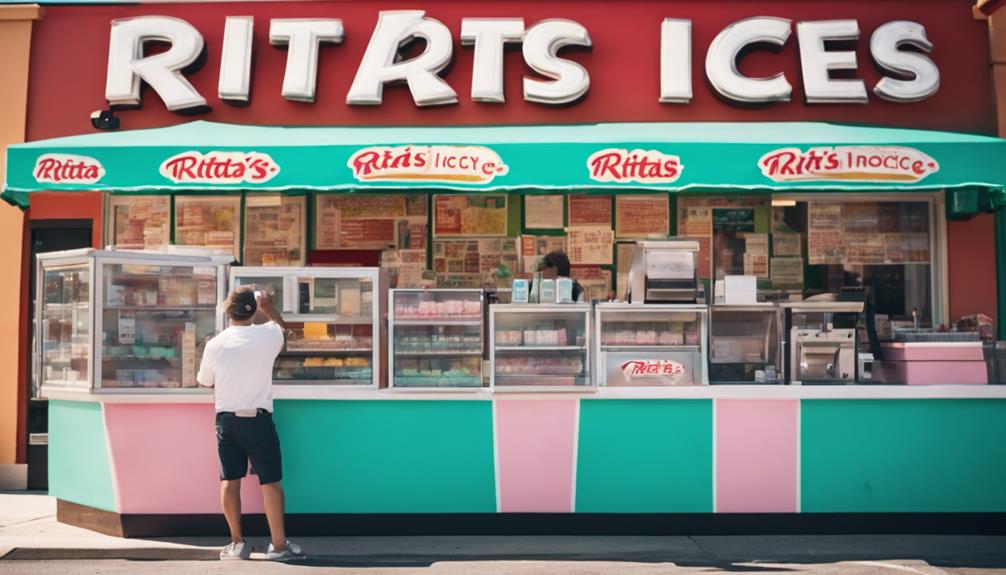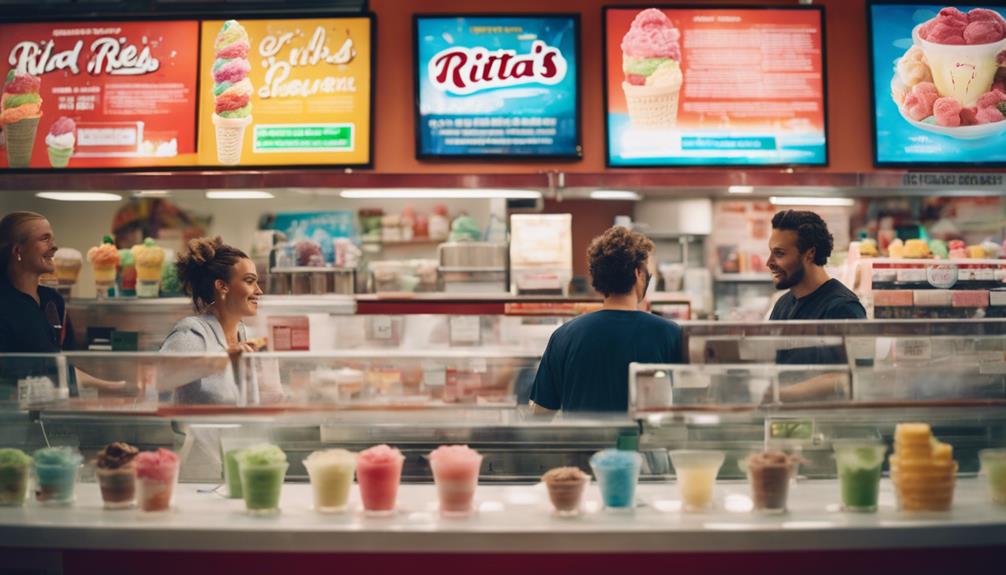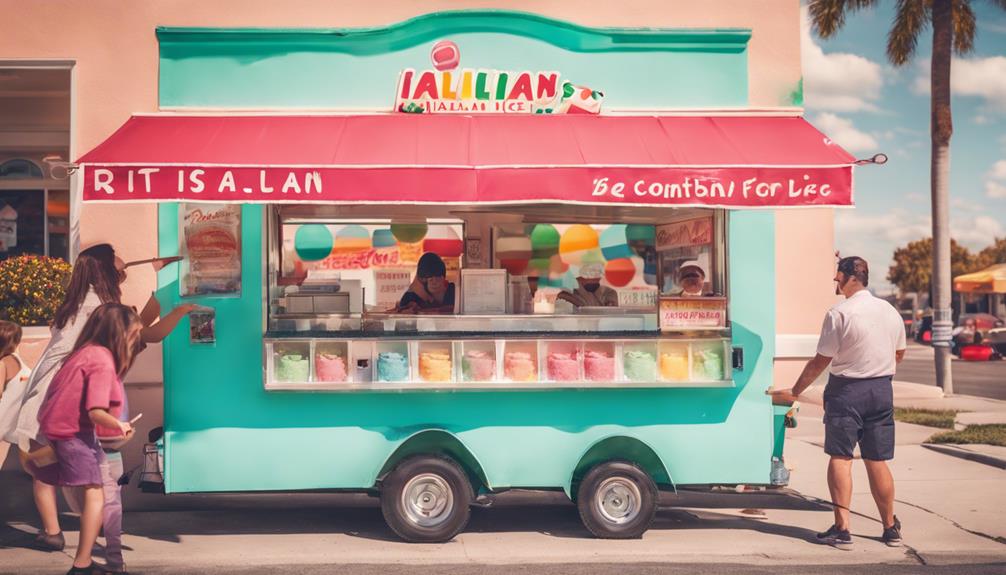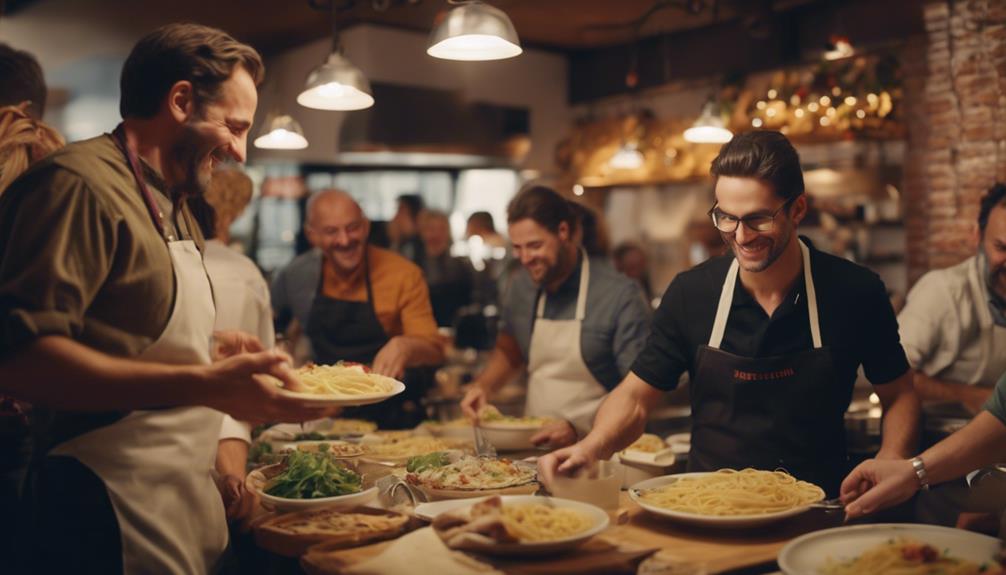Rita's Italian Ice has found success as a franchise by combining delicious frozen desserts with a strong commitment to community engagement. Founded in 1984, it operates 533 units and emphasizes family-friendly environments that encourage repeat visits. The brand hosts events like free treats on the first day of spring, enhancing local connections and brand loyalty. Franchisees receive extensive support and training while benefiting from ongoing marketing initiatives. With growth in the frozen dessert market and an appealing range of products, Rita's continues to thrive. Discovering more about its franchise model reveals even more about its sweet success.
Key Elements

In exploring the key elements of Rita's Italian Ice franchise, it's vital to understand the company's foundation and its operational model. The franchise offers a unique blend of community engagement and brand strength, making it an appealing choice for potential franchisees.
Additionally, the information provided for franchisees outlines important aspects of investment and support, ensuring a well-rounded understanding of the opportunity.
Company Overview
Rita's Italian Ice, founded in 1984 by Bob Tumolo, has grown into a recognized name in the frozen dessert industry, boasting a strong franchise presence and a commitment to community engagement.
The company operates under Rita's Franchise Co. LLC, led by President and CEO Linda Chadwick. With a focus on family-friendly experiences, Rita's offers a variety of frozen desserts, including Italian ice, and actively participates in local community events.
Their social media presence spans multiple platforms, enhancing brand visibility and connection with customers. The franchise emphasizes quality, customer service, and community involvement, fostering strong relationships with franchisees and customers alike, which solidifies their reputation in a competitive market.
Business Overview
With a unique blend of quality frozen desserts and community engagement, Rita's Italian Ice has established itself as a significant player in the food industry. Founded in 1984, the franchise focuses on delivering a revitalizing experience through its signature Italian ice, custard, and other frozen treats.
The brand thrives on its commitment to local communities, hosting events and providing free treats on the first day of spring. Rita's operates 533 units as of 2023, showcasing its reach despite a slight decrease in recent years.
The franchise emphasizes strong customer connections and family-friendly environments, enhancing its reputation and encouraging repeat visits. This clear business strategy underpins Rita's ongoing success in a competitive marketplace.
Information for Franchisees
Franchisees gain access to extensive training and ongoing support, ensuring they can effectively manage their operations and engage with the community.
Rita's Italian Ice provides an initial training program, covering essential aspects of business management and customer engagement. The franchise agreement typically lasts ten years, with options for renewal, and franchisees must meet specific net worth and liquid capital requirements.
The brand also allows absentee ownership and offers mobile or home-based unit operations. Additionally, franchisees benefit from exclusive territories, promoting local engagement through events like free Italian ice giveaways and fundraising activities.
With a strong commitment to community involvement, Rita's creates a supportive environment for franchisees to thrive and contribute positively to their neighborhoods.
Company Overview

Founded in 1984 by Bob Tumolo and named after his wife, Rita, Rita's Italian Ice has established itself as a community-focused leader in the frozen dessert industry.
The franchise has seen notable improvement in its rankings, moving up to #424 in 2024.
With a commitment to engaging local communities, Rita's continues to thrive while maintaining its family-oriented values.
Founded in 1984 by Tumolo
In 1984, Bob Tumolo launched Rita's Italian Ice, naming the brand after his wife, Rita, and creating a beloved staple in the frozen dessert industry. The concept focused on invigorating Italian ice, which quickly gained popularity among consumers seeking a unique treat.
Tumolo's dedication to quality and flavor set the foundation for the brand's growth. Over the years, Rita's expanded its offerings to include a variety of frozen desserts, attracting a loyal customer base.
In 2017, the company was acquired by Argosy Private Equity and MTN Capital, further fueling its franchise potential. Today, Rita's Italian Ice operates over 500 locations, continuing to delight customers with its signature icy treats and fostering a sense of community through its innovative approach.
Community-Focused Frozen Dessert Leader
Rita's Italian Ice stands out as a community-focused leader in the frozen dessert industry, blending quality offerings with a commitment to local engagement.
The brand actively promotes family-oriented gatherings, providing birthday party packages that include a variety of frozen treats.
Each year, Rita's celebrates the first day of spring by giving away free Italian ice, fostering community spirit and excitement.
They also engage in annual fundraising events that support local sports and health organizations, demonstrating their dedication to positively impacting neighborhoods.
This focus on community connection not only strengthens brand loyalty but also enhances Rita's reputation as a beloved local staple, making it a sweet success in the competitive frozen dessert market.
Founders: Bob and Rita Tumolo
Creating a beloved frozen dessert brand, Bob Tumolo established Rita's Italian Ice in 1984, naming it after his wife, Rita. From its humble beginnings in a small storefront in Bensalem, Pennsylvania, the couple aimed to provide a rejuvenating treat that embodies the spirit of Italian ice.
Bob's passion for quality and Rita's support laid the foundation for a thriving business that quickly gained popularity. Their commitment to customer satisfaction and community engagement helped Rita's Italian Ice grow into a recognizable name in the frozen dessert industry.
Today, the brand continues to honor their legacy, offering franchise opportunities that allow others to share in the sweet success of their vision.
Franchise Ranking Improvement Noted
After experiencing a notable decline in units over the past three years, the franchise has rebounded in its rankings, moving from #473 to #424 in 2024. This improvement reflects the brand's renewed focus on operational efficiency and enhanced support for franchisees.
With 533 units still in operation, Rita's Italian Ice is reaffirming its presence in the competitive frozen dessert market. The franchise's commitment to community engagement and quality products has contributed to its resurgence.
Additionally, ongoing marketing strategies and promotional events have bolstered consumer interest, helping to attract new customers. As Rita's continues to adapt to industry trends, its upward trajectory in rankings signals a promising future for both the brand and its franchisees.
Brand Identity

Rita's Italian Ice has established a strong brand identity through its impressive Franchise 500 ranking and commitment to family-oriented community engagement.
The brand not only focuses on creating memorable experiences with its birthday party packages but also actively participates in local events, reinforcing its connection to families.
This combination of recognition and community involvement helps Rita's stand out in the competitive frozen dessert market.
Franchise 500 Ranking Success
Achieving a notable position in the Franchise 500 rankings greatly enhances a brand's identity and visibility in the competitive food industry.
Rita's Italian Ice, ranked #424 in 2024, showcases its resilience and growth potential. This upward movement from #473 signifies the brand's commitment to improvement and market presence.
The recognition not only boosts franchisee confidence but also attracts potential investors, reinforcing Rita's reputation as a trusted franchise.
Consumers are more likely to choose a brand with a strong ranking, associating it with quality and reliability. As Rita's continues to climb, its brand identity solidifies, paving the way for enhanced customer loyalty and expansion opportunities in an ever-evolving market.
Family-Oriented Community Engagement
Emphasizing family-oriented values, Rita's Italian Ice actively engages with local communities to create memorable experiences and foster lasting connections.
The franchise hosts various events, including the tradition of giving away free Italian ice on the first day of spring, which attracts families and friends alike.
Additionally, Rita's organizes annual fundraising events that support local sports teams and health organizations, reinforcing their commitment to community well-being.
These initiatives not only enhance brand loyalty but also position Rita's as a beloved local staple.
By focusing on family gatherings and celebrations, Rita's Italian Ice cultivates an inviting atmosphere where community members can come together, enjoy delicious treats, and create lasting memories.
This strategic engagement strengthens their brand identity and promotes positive community relationships.
Family-Oriented Birthday Packages
Building on their commitment to family engagement, Rita's Italian Ice offers birthday packages that create joyful and memorable celebrations for children and their families.
These packages include a variety of delicious Italian ice flavors, alongside options for ice cream and customizable party favors. Each birthday celebration is designed to guarantee kids have a blast while parents enjoy a stress-free experience.
Rita's staff takes care of the setup and cleanup, allowing families to focus on making memories. Additionally, the vibrant, inviting atmosphere of their locations enhances the overall experience.
With a focus on fun and togetherness, Rita's Italian Ice effectively reinforces its brand identity as a family-friendly franchise, making it a popular choice for birthday parties.
Information for Franchisees

Franchisees benefit from extensive training and ongoing support, ensuring they're well-equipped to manage their Rita's Italian Ice business effectively.
The initial training program covers essential operations, marketing strategies, and customer service skills. Once they launch, franchisees have access to continuous support, including business operation advice and marketing assistance.
Rita's encourages community engagement, providing franchisees with tools to enhance their local presence. Additionally, they can operate absentee, allowing flexibility in ownership.
Exclusive territories are granted, which helps reduce competition and boosts sales potential.
With a focus on family-oriented experiences and community involvement, franchisees can cultivate a loyal customer base while enjoying the benefits of being part of a recognized and beloved brand.
Financial Requirements & Ongoing Fees

When considering a Rita's Italian Ice franchise, potential owners should be aware of the financial landscape.
The initial investment ranges from $293,000 to $673,000, including a $35,000 franchise fee.
Additionally, franchisees will pay ongoing royalty fees of 6.5% of gross sales, along with contributions for marketing and maintenance expenses.
Investment Range: $293k – $673k
The investment range for opening a Rita's Italian Ice franchise falls between $293,000 and $673,000, encompassing both initial startup costs and ongoing fees. This range includes the initial franchise fee of $35,000, along with necessary capital for equipment, inventory, and other operational expenses.
Potential franchisees need to meet minimum net worth requirements of $300,000 and maintain at least $100,000 in liquid assets. Additionally, there's an ongoing royalty fee of 6.5% of gross sales, supplemented by an advertising fee.
This structured investment framework guarantees franchisees are financially prepared to operate successfully, allowing them to focus on delivering quality products while benefiting from Rita's established brand and support network.
35,000 Initial Franchise Investment
Starting a Rita's Italian Ice franchise requires a significant initial investment, which ranges from $293,000 to $673,000, depending on various operational needs. This investment includes a franchise fee of $35,000.
Prospective franchisees must also meet a minimum net worth requirement of $300,000 and maintain at least $100,000 in liquid assets. These financial prerequisites guarantee that franchisees are well-prepared to handle the costs associated with starting and running the business.
Additionally, ongoing fees include a royalty of 6.5% of gross sales, alongside other potential advertising contributions. This structured investment model helps maintain the brand's reputation while providing franchisees the support they need to thrive in a competitive market.
.5% of Gross Sales
Ongoing financial commitments for Rita's Italian Ice franchisees include a royalty fee of 6.5% of gross sales, along with additional advertising contributions that support brand visibility and marketing efforts.
This structure guarantees that franchisees contribute to a collective marketing strategy aimed at strengthening the brand's presence in the competitive frozen dessert market.
Franchisees can expect these financial obligations to reflect their store's performance, meaning higher sales generate higher fees.
Additionally, maintaining sufficient cash flow is essential for managing these ongoing costs.
Franchisees who understand and manage these financial requirements effectively can enhance their chances of long-term success and profitability within the Rita's Italian Ice franchise system.
Marketing Contribution Percentage
Franchisees must also contribute to a marketing fund, which typically amounts to a percentage of their gross sales, enhancing the overall brand visibility and outreach.
This marketing contribution is essential for funding national advertising campaigns and promotional initiatives that strengthen the Rita's Italian Ice brand. By pooling resources, franchisees collectively benefit from increased consumer awareness and foot traffic.
The ongoing advertising fee is in addition to the 6.5% royalty fee on gross sales, ensuring robust brand representation across various media. This strategic investment helps franchisees stay competitive in the frozen dessert market and fosters community engagement through local events and promotions.
Ultimately, this collaboration drives sales and supports sustained growth for all franchise locations.
Maintenance and Supplies Expenses
In addition to the royalty and advertising fees, franchisees must budget for maintenance and supplies expenses to guarantee their locations operate smoothly and meet brand standards.
These costs include regular upkeep of equipment, which is vital for maintaining product quality and customer satisfaction. Franchisees should also account for the purchase of supplies like Italian ice ingredients, packaging, and promotional materials.
By planning for these expenses, franchisees can avoid unexpected financial strain and assure their business remains compliant with Rita's operational guidelines.
This proactive approach helps in sustaining a reliable supply chain, ultimately contributing to the overall success and longevity of their franchise.
Properly managing these costs is essential for maximizing profitability and enhancing customer experience.
Financing Options

When considering financing options for a Rita's Italian Ice franchise, potential owners can explore several avenues.
In-house funding options are available, along with alternative sources that can help meet initial investment requirements.
Additionally, government-backed loan providers offer support for those seeking financial assistance to launch their franchise.
In-House Funding Options Available
Rita's Italian Ice offers various in-house financing options to help aspiring franchisees meet their initial investment requirements. These options include flexible payment plans and potential assistance with equipment financing, enabling franchisees to minimize their upfront costs.
By providing tailored financial solutions, Rita's guarantees that franchisees can allocate their resources effectively, focusing on building their businesses rather than worrying about funding constraints.
Additionally, franchisees may benefit from ongoing financial guidance and support to navigate their early operational phases.
This commitment to in-house financing not only aids franchisees in getting started but also fosters a strong partnership between Rita's and its franchise community, setting the stage for mutual success and growth.
Alternative Funding Sources Available
Aspiring franchisees can explore a variety of alternative funding sources to help cover their initial investment and operational costs. They might consider seeking out private investors or angel investors who are interested in funding promising business ventures.
Crowdfunding platforms also offer a modern way to gather small amounts from many contributors, allowing franchisees to raise necessary capital while engaging potential customers early on.
Additionally, some franchisees turn to personal savings or retirement accounts for funding, although they should tread carefully to avoid penalties.
Government-Backed Loan Providers
Government-backed loan providers offer valuable financing options for those looking to invest in a Rita's Italian Ice franchise. These loans typically feature lower interest rates and more flexible repayment terms, making them an attractive choice for prospective franchisees.
Programs such as the SBA 7(a) loan can help cover initial investments ranging from $293K to $673K, including the franchise fee of $35,000. Additionally, applicants can finance equipment, inventory, and working capital.
With requirements like a minimum net worth of $300,000 and $100,000 in liquid assets, government-backed loans can bridge the financial gap for many aspiring entrepreneurs.
Training & Support Offered

Rita's Italian Ice provides franchisees with thorough onboarding sessions to guarantee a strong start.
They also offer continuous skill enhancement programs and ongoing operational assistance, equipping franchisees with essential marketing tools.
This robust support system helps franchisees thrive in a competitive market.
Comprehensive Onboarding Sessions Offered
Franchisees benefit from thorough onboarding sessions designed to equip them with essential skills and knowledge for operating their Rita's Italian Ice location successfully.
These sessions cover vital topics such as product preparation, customer service, and inventory management. Franchisees learn about the brand's unique offerings, guaranteeing they can deliver the quality and experience customers expect.
Additionally, the onboarding includes hands-on training at a corporate location, allowing franchisees to practice their skills in a supportive environment. By fostering a deep understanding of the business model, Rita's guarantees franchisees feel confident as they launch their stores.
This all-encompassing approach sets the stage for a successful and profitable franchise journey, facilitating smoother operations and better customer satisfaction right from the start.
Continuous Skill Enhancement Programs
Ongoing training programs guarantee franchise owners continually enhance their skills and adapt to evolving industry trends.
Rita's Italian Ice emphasizes the importance of continuous skill development through various training options tailored to meet individual needs.
Franchisees receive initial training, which covers essential aspects of operations, customer service, and product knowledge.
Additionally, ongoing support guarantees that they stay informed about new techniques, product offerings, and operational best practices.
This commitment to education helps franchise owners maintain a competitive edge and fosters a culture of excellence within the brand.
Operational Assistance and Marketing Tools
Thorough operational assistance and effective marketing tools empower franchise owners to successfully navigate the competitive landscape of the frozen dessert industry.
Rita's Italian Ice provides extensive initial training programs that equip franchisees with essential skills for running their business. Ongoing support guarantees that they remain competitive and efficient in operations.
Franchisees also benefit from exclusive territories, allowing them to establish a strong local presence. The marketing tools offered include promotional materials and guidance on social media strategies, helping franchise owners effectively engage with their target audiences.
Additionally, the option for absentee ownership and flexibility in operations—whether home-based or mobile—further enhances franchisee success, making Rita's a compelling choice for aspiring entrepreneurs.
LEGAL AND REGULATORY

Rita's Italian Ice franchisees must navigate various legal obligations to guarantee compliance with franchise laws.
Understanding the franchise agreement is essential, as it outlines the rights and responsibilities of both parties.
Additionally, franchisees need to stay updated on any regulatory changes that could impact their operations and financial performance.
Franchise Legal Obligations Summary
When considering a Rita's Italian Ice franchise, potential franchisees need to understand their legal obligations.
Key sections of the franchise agreement outline essential responsibilities, including compliance with regulatory standards.
It's vital for franchisees to review these obligations thoroughly to guarantee a successful partnership.
Key Sections to Review
Franchisees must understand their legal obligations outlined in the franchise agreement to secure compliance and successful business operations.
This includes recognizing the terms regarding fees, renewal options, and support provided.
They should also be aware of their responsibilities related to territory rights and operational guidelines.
Understanding these key sections guarantees that franchisees can navigate the complexities of their agreement effectively.
Legal Obligations
Understanding the legal obligations outlined in the franchise agreement is essential for franchisees to secure compliance and maintain successful operations.
Franchisees must adhere to the terms regarding fees, territory rights, and operational standards. They're also required to complete initial training and ongoing support programs.
Meeting net worth and cash requirements secures financial stability, contributing to the overall success of the franchise.
MARKET ANALYSIS

The frozen dessert market is experiencing significant growth, driven by increasing consumer demand for sweet treats.
Rita's Italian Ice taps into a family-oriented consumer base, appealing to those looking for fun, shared experiences.
This strategic focus positions the franchise well within a competitive landscape, enhancing its potential for success.
Frozen Dessert Market Growth
The frozen dessert market has seen a significant uptick in consumption, reflecting changing consumer preferences and a growing demand for variety.
Trends indicate that consumers are increasingly favoring healthier options, leading to innovations in flavors and ingredients.
As Rita's Italian Ice navigates this evolving landscape, understanding these dynamics will be essential for its continued success.
Frozen Dessert Consumption Increase
Frozen dessert consumption has seen a significant uptick, driven by changing consumer preferences and a growing demand for indulgent treats.
This increase highlights a shift toward convenience and variety, as people seek new flavors and experiences.
Additionally, health-conscious options like lower-calorie and dairy-free alternatives have gained traction, appealing to a broader audience and further fueling the market's expansion.
Frozen Dessert Consumption Trends
Market analysis reveals that consumer preferences continue to shape frozen dessert trends, with an increasing appetite for unique flavors and healthier options driving growth in the industry.
As consumers seek out vibrant, artisanal products, Rita's Italian Ice can capitalize on these trends.
Expanding innovative flavor offerings and promoting lower-calorie options align with current market demands, positioning the brand for sustained success.
Family-Oriented Consumer Base
Rita's Italian Ice thrives on a family-oriented consumer base, appealing to parents seeking enjoyable treats for their children.
Recent trends show a growing preference for frozen desserts during family outings and celebrations, positioning Rita's as a go-to destination.
This focus on family dynamics not only drives sales but also strengthens community ties through shared experiences.
Family-Oriented Consumer Demographics
Focusing on family-oriented consumer demographics, Rita's Italian Ice taps into a vibrant market segment that values shared experiences and celebratory moments.
Families seek enjoyable outings, and Rita's provides a perfect setting for celebrations, birthdays, and gatherings.
The brand's commitment to community engagement and family-friendly offerings fosters loyalty, making it a go-to destination for families looking to create lasting memories together.
Frozen Dessert Consumption Trends
Consumers are increasingly gravitating towards frozen desserts, driven by a desire for revitalizing treats that enhance family gatherings and celebrations.
This trend reflects a growing preference for shareable, fun experiences. Families seek invigorating options that cater to various tastes, making frozen desserts a staple at events.
As a result, franchises like Rita's Italian Ice thrive by tapping into these family-oriented consumption patterns.
EXIT STRATEGY

When it comes to exit strategies, franchisees of Rita's Italian Ice have several options for transferring ownership.
They can take advantage of established protocols that facilitate a smooth changeover, ensuring that new owners can continue the business effectively.
This flexibility allows franchisees to find the best path forward, whether they're stepping back for personal reasons or seeking new opportunities.
Franchisee Transfer Options Available
Franchisees looking to transfer their Rita's Italian Ice business have clear options outlined in the franchise agreement, ensuring a smooth shift for both parties involved. They can either sell their franchise to a qualified buyer or transfer it to a family member.
The franchise agreement typically requires potential buyers to undergo a vetting process to maintain brand standards. Franchisees must notify the franchisor of their intent to transfer and follow the stipulated procedures, which may include an approval period.
This structure not only protects the integrity of the brand but also provides a straightforward exit strategy for franchisees, making it easier for them to step away while ensuring the continued success of their business.
Franchisee Ownership Transition Strategies
Effective ownership strategies are essential for franchisees planning their exit from a Rita's Italian Ice business, ensuring a seamless handover while maintaining brand integrity.
Franchisees should start by developing a clear exit plan well in advance, which includes identifying potential buyers and evaluating the business's worth.
Utilizing Rita's franchise support, they can streamline the changeover process by adhering to brand guidelines and ensuring operational continuity.
Training new owners is vital, so existing franchisees should share their knowledge and best practices.
Additionally, leveraging community connections can enhance the business's attractiveness to prospective buyers.
ADDITIONAL RESOURCES

In exploring Rita's Italian Ice franchise, prospective owners can benefit from various additional resources.
These include an organized franchise event schedule, detailed training programs, and networking opportunities designed to foster connections within the franchise community.
Franchise Event Schedule
The franchise event schedule offers valuable opportunities for networking and learning, showcasing upcoming gatherings that can enhance franchisee success.
These events play an essential role in connecting franchise owners with industry experts and fellow franchisees, fostering an environment of collaboration and support.
Attendees gain insights into effective business strategies, marketing techniques, and operational best practices that can greatly impact their profitability.
In addition, the schedule includes regional meetings, national conventions, and training workshops, ensuring franchisees can select events that best suit their needs.
Franchise Event Schedule Details
Franchisees can access a detailed schedule of upcoming events that includes regional meetings, national conventions, and training workshops tailored to enhance their business skills and networking opportunities.
These events provide franchisees with the chance to connect with industry leaders, share best practices, and gain insights into market trends. Each gathering focuses on key topics relevant to running a successful Rita's Italian Ice location, ensuring franchisees stay informed and empowered.
Additionally, the schedule accommodates various timeframes and locations, making it easier for franchisees to participate. By attending these events, franchisees not only improve their operational knowledge but also strengthen the community within the Rita's network, fostering collaboration and support among peers.
Franchise Training and Networking Opportunities
To enhance their operational skills and expand their networks, franchise owners benefit from a variety of training programs and networking opportunities offered by Rita's Italian Ice.
The initial training equips new franchisees with essential knowledge about business operations, marketing strategies, and customer service excellence. Additionally, ongoing support guarantees that franchisees stay updated on industry trends and best practices.
Networking events provide franchise owners with a platform to connect with fellow franchisees, share experiences, and collaborate on innovative strategies. Through these interactions, they gain valuable insights that can drive growth and success.
This commitment to training and networking fosters a strong community, empowering franchise owners to thrive in their respective markets while aligning with the brand's vision.
What Makes Rita’s Italian Ice and Nothing Bundt Cakes Franchise Successful?
Rita’s Italian Ice and nothing bundt cakes franchise have found success by offering unique and high-quality products. The Nothing Bundt Cakes franchise in particular has grown rapidly due to its delicious and carefully crafted bundt cakes. Both franchises have also excelled in providing excellent customer service and maintaining a strong brand image.
Conclusion
Rita's Italian Ice exemplifies a successful franchise model, blending quality products with a strong community focus.
Despite a slight decline in locations, the brand's commitment to its franchisees and customers remains steadfast.
With a solid support system and attractive investment opportunities, Rita's continues to thrive in the competitive frozen dessert market.
As they look to the future, their rich heritage and dedication to community engagement will certainly drive further growth and success.









